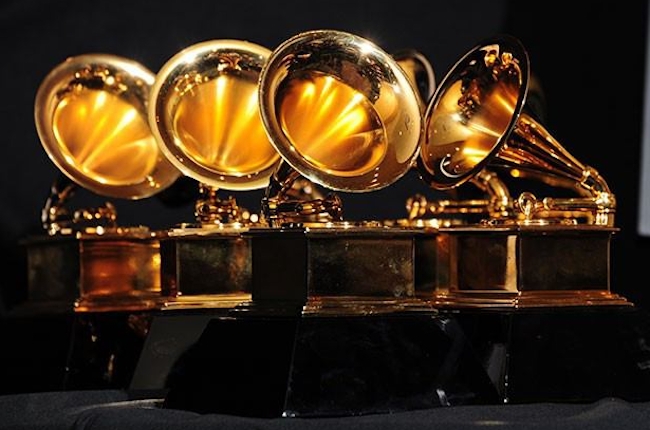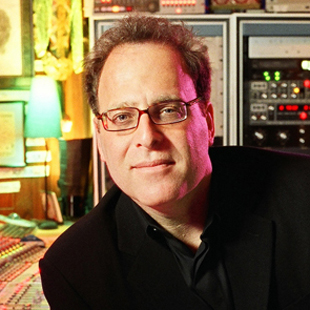Trending
Opinion: How will Project 2025 impact game developers?
The Heritage Foundation's manifesto for the possible next administration could do great harm to many, including large portions of the game development community.

Featured Blog | This community-written post highlights the best of what the game industry has to offer. Read more like it on the Game Developer Blogs or learn how to Submit Your Own Blog Post
The Grammy Awards will air on Monday, so let's explore the ways in which the Visual Media category of the Grammys has changed over the years in the attempt to accommodate video game soundtracks.

 It's Grammy Awards time! On Monday night, the National Academy of Recording Arts and Sciences (NARAS) will throw its annual party, and many golden gramophones will be awarded to the popular recordings that were deemed most worthy this year. This is one of the most prestigious honors for any musician. Each year, Grammy nominees are selected as representing the top of their field: the very best in professional music. There are 83 Grammy categories this year, ranging from famous categories like Album of the Year to lesser known categories such as Best Children's Album. Among those 83 categories, we don't find a Best Video Game Music category listed... but we do see the category Best Score Soundtrack for Visual Media (Includes Film, TV, Video Games and Other Visual Media). The Best Score Soundtrack for Visual Media category has gone through some interesting transformations during the long history of the Grammy Awards. In this article, we'll be taking a walk down memory lane, exploring the ways in which the Visual Media category has changed to accommodate video game soundtracks.
It's Grammy Awards time! On Monday night, the National Academy of Recording Arts and Sciences (NARAS) will throw its annual party, and many golden gramophones will be awarded to the popular recordings that were deemed most worthy this year. This is one of the most prestigious honors for any musician. Each year, Grammy nominees are selected as representing the top of their field: the very best in professional music. There are 83 Grammy categories this year, ranging from famous categories like Album of the Year to lesser known categories such as Best Children's Album. Among those 83 categories, we don't find a Best Video Game Music category listed... but we do see the category Best Score Soundtrack for Visual Media (Includes Film, TV, Video Games and Other Visual Media). The Best Score Soundtrack for Visual Media category has gone through some interesting transformations during the long history of the Grammy Awards. In this article, we'll be taking a walk down memory lane, exploring the ways in which the Visual Media category has changed to accommodate video game soundtracks.
But first, let's take a look at a video about the Grammy Awards voting process, produced by the National Academy of Recording Arts and Sciences and hosted by Recording Academy Awards vice president Bill Freimuth and Sr. Managing Director Laura Segura Mueller.
In 1999, when the Grammys wanted to recognize music released in a soundtrack album, they nominated it in the category Best Instrumental Composition Written for A Motion Picture or For Television. Video game soundtracks weren't eligible. So a coalition of game composers and game audio pros set about changing that. The coalition included Murray Allen, Alexander Brandon, Ron Hubbard, Michael Land, Mark Miller, Bobby Prince, Greg Rahn, George Sanger, Brian Schmidt, Tommy Tallarico, Chance Thomas, Tom White, and others. Together, they lobbied the National Academy of Recording Arts and Sciences to recognize video game music with its own category. After an awesome concerted effort on the part of this coalition, in 2001 the Grammys modified the name of the category. Music released on a soundtrack album could thereafter be entered into the category Best Instrumental Composition Written for Motion Pictures, Television or Other Visual Media.
While this was a victory of sorts, it stuck in the craw of the most passionate supporters of video game music. A full decade passed before the category name would be reassessed, and in the meantime, prominent members of the game audio community continued to speak out.
 Steve Schnur, president of the Electronic Arts Music Group division, led this renewed effort to establish a Grammy category for video game music, and was its most vocal supporter. "This generalization of 'Other Visual Media' isn't merely an insult to the video game industry," said Schnur, "but a blatant dismissal of these composers and their work." Schnur added, "The current situation must be rectified immediately."
Steve Schnur, president of the Electronic Arts Music Group division, led this renewed effort to establish a Grammy category for video game music, and was its most vocal supporter. "This generalization of 'Other Visual Media' isn't merely an insult to the video game industry," said Schnur, "but a blatant dismissal of these composers and their work." Schnur added, "The current situation must be rectified immediately."
In 2011, the Grammys changed the category name to its current state: Best Score Soundtrack for Visual Media (Includes Film, TV, Video Games and Other Visual Media). This is the category as it exists today. The good? Video Games are now recognized in the category name. The bad? In the archival database of Grammy winners on the official NARAS web site, the category name is shortened to just Best Score Soundtrack for Visual Media. No "Film," no "TV," and no "Video Games." Also, when reporting on the Grammys, many web sites shorten the category name to omit the parenthetical. So did this name change make video game music more visible, or less? Among long-time Grammy voters who are familiar with the Visual Media category from the decades of its use as a film/television catch-all, will video games seem like an odd addition? Do people, generally speaking, think of video games as a "visual media" art form?
 Game composers such as ourselves are intimately aware that comparing film and television music to game music is an "apples to oranges" situation. After all, the originating dramatic medium is drastically different. Games couldn't be any more dissimilar to films and television programs. An audience watches a film or a television program. A gamer plays a game. It's an active experience. The structural divergence in the originating dramatic medium makes the genre and style of game music fundamentally distinct. As a result, game music is perceived and enjoyed by listeners in unique ways that bear little relation to the ways in which film and television music are enjoyed. I explore this idea in more detail in chapter four of my book, A Composer's Guide to Game Music (beginning on p. 56).
Game composers such as ourselves are intimately aware that comparing film and television music to game music is an "apples to oranges" situation. After all, the originating dramatic medium is drastically different. Games couldn't be any more dissimilar to films and television programs. An audience watches a film or a television program. A gamer plays a game. It's an active experience. The structural divergence in the originating dramatic medium makes the genre and style of game music fundamentally distinct. As a result, game music is perceived and enjoyed by listeners in unique ways that bear little relation to the ways in which film and television music are enjoyed. I explore this idea in more detail in chapter four of my book, A Composer's Guide to Game Music (beginning on p. 56).
The game music professional community is still fighting to have game soundtracks recognized by a separate category in the Grammy Awards, and the National Academy of Recording Arts and Sciences is not unsympathetic to the cause. When the category name was changed to its current form in 2011, Recording Academy Awards vice president Bill Freimuth said, "I think this could be viewed as a first step in the direction of video games getting their own category."
Here's hoping that in the future we'll see a video games category in the Grammy Awards. In the meantime, I'd like to wish good luck to all the talented musical artists up for Grammy awards this year!
 Winifred Phillips is an award-winning video game music composer whose most recent project is the triple-A first person shooter Homefront: The Revolution. Her credits include five of the most famous and popular franchises in video gaming: Assassin’s Creed, LittleBigPlanet, Total War, God of War, and The Sims. She is the author of the award-winning bestseller A COMPOSER'S GUIDE TO GAME MUSIC, published by the Massachusetts Institute of Technology Press. As a VR game music expert, she writes frequently on the future of music in virtual reality video games.
Winifred Phillips is an award-winning video game music composer whose most recent project is the triple-A first person shooter Homefront: The Revolution. Her credits include five of the most famous and popular franchises in video gaming: Assassin’s Creed, LittleBigPlanet, Total War, God of War, and The Sims. She is the author of the award-winning bestseller A COMPOSER'S GUIDE TO GAME MUSIC, published by the Massachusetts Institute of Technology Press. As a VR game music expert, she writes frequently on the future of music in virtual reality video games.
Follow her on Twitter @winphillips.
Read more about:
Featured BlogsYou May Also Like